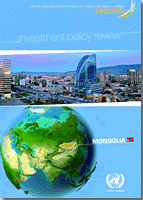
Mongolia is a resource-rich country with formidable growth prospects. Having adopted a democratic system and a market economy, the country is today at a turning point, as the discovery of huge mineral resources could pave the way to rapid economic and social development. While many of the building blocks of such development are in place, further efforts are required to ensure that the revenues derived from the mining industry are used effectively and geared towards sustainable development. In particular, economic diversification is fundamental to achieving inclusive growth and poverty reduction. Foreign direct investment (FDI), which has grown considerably in recent years, has been mostly in mining and is also concentrated by country of origin and geographically to the capital. To address the current situation and promote more inclusive growth, the IPR focuses on how to attract and use FDI to foster diversification by sector, by investor and by region within the country.
In order to attract FDI outside of mining and from non-traditional sources, Mongolia will have to improve its investment climate. Adopting a comprehensive FDI policy with concrete developmental objectives is a necessary first step. Moreover, investment legislation should be revised to reflect Mongolia's open stance and practice towards FDI and investor screening mechanisms stipulated in the law should be abandoned. Institutional capacity needs significant strengthening to implement and enforce regulatory reforms and improve efficiency. The investment promotion agency, in particular, should become a modern, proactive institution with private sector expertise. Other regulatory deficiencies requiring policy attention include: enforcement of licensing and permits, access to foreign workers, and project selection criteria in the concessions regime.
The IPR identifies six programmes to achieve diversification through FDI and other activities of foreign companies:
Tackling the infrastructure challenge: attracting FDI, where commercially viable, in infrastructure development including in roads, railways, energy and housing.
Building knowledge and skills: establishing professional and technical training institutes in partnership with internationally-recognized institutions. Facilitating entry of foreign skilled workers and targeting the Mongolian diaspora to close specific skills gaps.
Developing financial and business services in Ulaanbaatar: targeting leading financial services clusters and developing the city as a regional headquarters' hub in the future.
Unleashing the potential of tourism: exploiting niche market opportunities in adventure tourism, eco-tourism and other special interest groups. Targeting high-end and sustainable operations that are environmentally friendly, creating jobs and using local supply sourcing.
Promoting niche markets — meat and cashmere: improving the quality and branding of these goods so that they can be inserted into international value chains.
Promoting small and medium enterprise (SME) development and entrepreneurship for regional diversification: establishing SME-TNC linkages programmes and regional entrepreneurship centres.


